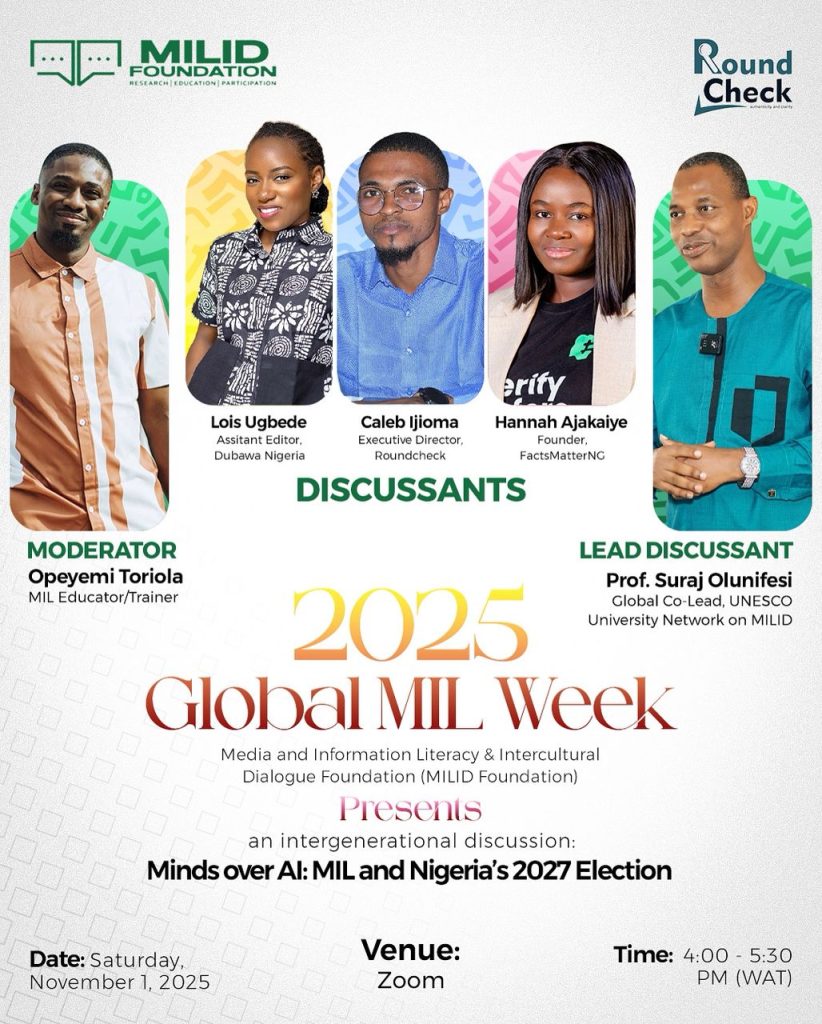
Media experts emphasize collaboration, awareness, and AI literacy to combat misinformation before Nigeria’s next general polls.
By Feyisayo Arowolo
Media and information experts have stressed the need to deepen understanding of Artificial Intelligence (AI) and Media and Information Literacy (MIL) ahead of Nigeria’s 2027 general elections, to curb the spread of misinformation and disinformation.
This emphasis was made on Saturday, 1st of November, during a virtual intergenerational discussion themed “Minds over AI: MIL and Nigeria’s 2027 Election,” organized by the Media and Information Literacy and Intercultural Dialogue (MILID) Foundation, in partnership with RoundCheck, a fact-checking organization, to mark the 2025 UNESCO Global MIL Week.
Leading the discussion, Prof. Suraj Olunifesi, Global Co-Lead of the UNESCO University Network on MILID, underscored the growing influence of AI on human life and the challenges its misuse poses to truth and democracy.
“AI has been here for long. It has affected how we live, how we do things, our conversations, the internet. AI is now gatekeeping, because of the misuse around it, it is not about truth, it cares about attention. AI prioritizes popularity over reasoning. It is all about clickbait culture,” he said.
Prof. Olunifesi explained how political actors exploit digital platforms and algorithms to manipulate public perception, warning that such tactics could undermine electoral integrity.
“There are so many tactics they are using like trading the game, mudding the waters, gaming the algorithm, astroturfing. When it comes to election, we have actors, I call them disinformation agents—the bots, politicians, fake news websites, conspiracy theorists, mainstream media, foreign governments, and highly partisan outlets,” he noted.
“AI is good but the misuse comes in form of misinformation and disinformation. The most pathetic is Deepfake. It can erode trust in democratic institutions, disenfranchise voters, and allow foreign influence to disrupt democracy,” he added.
He warned that Nigeria risks slipping into autocracy if those who understand how to manipulate AI algorithms continue to dominate the digital space.
Other discussants shared their ongoing efforts to promote media and information literacy in their various spheres.
Caleb Ijioma, Executive Director of RoundCheck, said his initiative trains young people to identify false information and mentor others. He added that his team is developing a web-based civic engagement game to enhance public participation.
Lois Ugbede, Assistant Editor at Dubawa Nigeria, described her work in promoting MIL among journalists, fact-checkers, and students across Africa, focusing on critical thinking, online engagement, and the use of digital verification tools.
Similarly, Hannah Ajakaiye, Founder of FactsMatterNG, said her organization reaches young and underserved audiences through fact-checking, civic education, and social media campaigns. She emphasized the role of content creators and influencers in helping the public recognize AI-generated content and disinformation trends.
On the way forward, the panelists emphasized collaboration, policy formulation, and public awareness as key strategies to safeguard Nigeria’s electoral process.
Prof. Olunifesi recommended that AI literacy be included in university curricula, and that INEC be trained and transparent in its use of AI tools. He also called for MIL policy, partnerships with tech giants, and measures to prevent foreign interference.
“AI literacy should be promoted. The university curriculum should include MIL/AI literacy. Tech companies need to know content credentials, INEC must be trained and transparent on the use of AI so we can know its neutrality,” he said.
Lois Ugbede added that partnerships with tech companies should be fostered to develop homegrown tools in local languages, while the media must sustain its watchdog role. Caleb Ijioma called for a Deepfake policy to ensure AI-generated content is flagged, and Hannah Ajakaiye emphasized collaboration with credible content creators and the expansion of interventions in local languages.
The discussion reaffirmed that as AI continues to shape the information landscape, strengthening media and information literacy will be vital to ensuring a fair, transparent, and informed democratic process ahead of Nigeria’s 2027 elections.
Feyisayo Arowolo is a final-year student of the department of Mass Communication, University of Lagos, who is passionate about everything media and communications.






